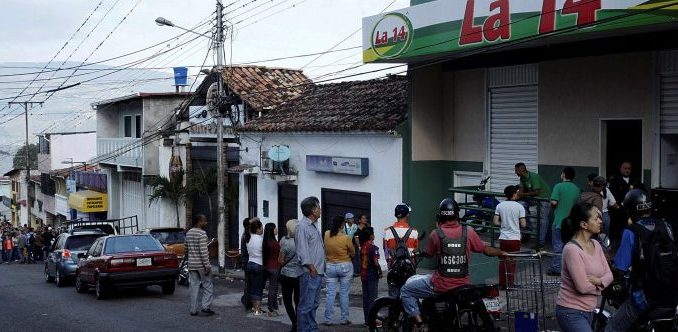
(WaPo) A friend recently sent me a photograph that tells a powerful story about the situation Venezuelans find themselves in now. It’s not a very good picture, really, just a blurry cellphone shot of trash: some wrapping material, an old CD — the detritus left behind after a store was looted last week in San Felix, a city in the country’s southeast.
And yet I can’t stop thinking about it, because strewn about in the trash are at least a dozen 20-bolivar bills, small-denomination currency now so worthless even looters didn’t think it was worth their time to stop and pick them up.
The photo stopped me dead in my tracks. In theory, according to the “official” exchange rate, which long ago lost even a hint of connection with reality, each of those bills is worth $2. In fact, as Venezuela sinks deeper and deeper into the first hyperinflation the Western Hemisphere has seen in a generation, bolivar banknotes have come to be worth basically nothing: Each bill is worth about $0.0001 at the current exchange rate, meaning you need to have 100 of them to equal one penny.
Prices are now rising more than 80 percent per month, according to the opposition-led National Assembly’s Finance Committee. (The government itself stopped publishing official inflation data long ago.) At that rate, prices double every 34 days or so. Salaries lag far behind, leaving more and more of the country to face outright hunger. Thus, the looting.
Rule No. 1 of surviving hyperinflation is simple: Get rid of your money. Given the speed with which money is shedding its value, holding on to it means you’re losing out. The second you’re paid you run out as fast as you can to buy something – anything – while you can still afford it. It’s better to hold almost any asset than money, because assets hold their value and money doesn’t.
Find a can of tuna? Buy it. Even if you hate tuna. Even if you have no intention of eating tuna. You can always trade it for something else later. Tuna holds its value. Money doesn’t.
I think this is what’s so hard to wrap your mind around if you’ve never experienced hyperinflation. It sounds like it’s about prices rising fast, but it really isn’t. It’s about money breaking down. Under hyperinflation, money no longer works. It doesn’t store value. It just stops doing the basic things people expect money to do. It stops being something you want to have and turns into something you’ll do anything to avoid having: something so worthless you won’t even bend down and scoop it up off the floor while you’re looting.
And that’s what it’s come to, widespread, state-aided looting. The final frontier in the collapse of Venezuela’s economy and civic culture. How did we get here?
Not so long ago, in 2015 and 2016, you probably remember reading about the long lines outside virtually every supermarket for basic goods. Lines formed because the government put price ceilings on all staple goods, and as you learn in the first week of any introductory economics course, price controls breed shortages.
And yet, paradoxically, the fact that those lines did form was a signal that at least people expected they would find price-controlled goods inside if they had the patience to brave the wait. So when lines began to vanish late last year, it wasn’t a sign of improvement — shortages had grown so bad that people gave up. Affordable staples just disappeared from the shelves for good, leaving only luxury products at international prices that only a minuscule elite could afford.
Instead, the government improvised a clumsy new system to deliver a package of staple goods to people’s homes each month. Unsurprisingly, given the dire state of state finances, that system soon broke down. Too few packages were reaching too few homes, leaving a gap that could be filled only by looting stores still selling expensive goods at international prices.
Of course, few stores will think of restocking after they’ve been looted, and virtually none can find the capital to do so. So it looks as though we’re coming to the end of the line: Every last avenue for people to put a meal on the table has been exhausted. A video that went viral recently showed Venezuelans literally running into a cow pasture to stone a calf to death to try to get a meal.
How can Venezuelans go on? One thing is clear: No one in power much cares.
| [adrotate group=”4″] |
[adrotate banner=”24″]

[pt_view id=”517b65fj16″]


Be the first to comment